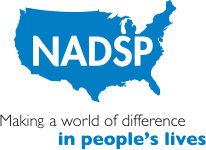
The Positive Impact Of Professional Development For DSPs
The following article is part of an ongoing series about the NADSP Competency Areas. The NADSP Competency Areas offer DSPs the opportunity to address challenges, work on issues identified by the person they support, or assist a person in pursuing a particular goal. Each Competency Area has corresponding skill statements that describe the knowledge and skills DSPs must have to demonstrate competency in each area.
This blog is about the skill statement “The competent DSP completes required training education/certification, continues professional development, and keeps abreast of relevant resources and information,” within the NADSP Competency Area: “Education, Training & Self-Development.”
Inside The Competency Area
Education, Training & Self-Development
Continuing education ensures that direct support professionals remain effective, ethical, and empowered at their jobs. Education of direct support professionals can serve to enrich the lives of the people they support and can strengthen the fabric of our communities where people live. When employers and organizations invest in the education of direct support professionals, we ultimately invest in the dignity, inclusion, and future of all people.
Direct support professionals are required to do a plethora of mandated and regulatory training. These are often associated with health and safety. There are many other things associated with providing person-centered direct support which can remain optional. However, the pursuit of knowledge is a responsibility and an obligation for professional integrity.
The competent DSP completes required training education/certification, continues professional development, and keeps abreast of relevant resources and information.
Inside The Skill Statement
The competent DSP completes required training education/certification, continues professional development, and keeps abreast of relevant resources and information.
A competent direct support professional is committed to ongoing learning and professional excellence. They must successfully complete all required training, education, and certifications to ensure they meet established standards of practice. Beyond these foundational requirements, they should actively pursue ongoing professional development opportunities to enhance their skills and deepen their understanding of the people they support. This should be encouraged and facilitated by the employer or provider organization for which the direct support professional is employed.
Direct support professionals must make it a priority to stay informed about new research, emerging best practices, and relevant resources that can improve the quality of services they provide. By maintaining this dedication to growth, the competent direct support professional strengthens their effectiveness and contributes to better outcomes for all.
The Impact On People Receiving Services
When direct support professionals commit to ongoing training, education, and professional development, the people they support experience higher-quality, safer, and more person-centered services. Staying current with best practices allows DSPs to use effective strategies for communication. They get better at behavior support. Direct support professionals are more up to date and knowledgeable about health and wellness. Community inclusion becomes more impactful and meaningful when direct support professionals are informed about the latest ways to best integrate and include people with disabilities within communities.
Ongoing education and development hopefully translates into people receiving support that respects their preferences and serves to promote their independence. Educated direct support professionals help and adapt to support strategies as needs and wishes change. Informed direct support professionals are also better equipped to recognize risks and respond to challenges. They can better advocate with and on behalf of the people they assist when they have improved knowledge and understanding. Ultimately, continual learning leads to more empowerment and truly person-centered support for those receiving services.
Putting It All Into Practice
Make learning a routine. Dedicate a few minutes each day or week to review new information – whether it’s agency updates, articles, training modules, or resources related to disability supports, communication strategies, or health and safety. Use what you learn as soon as you can. After completing a training or webinar, identify one concrete strategy you can apply that same day such as adjusting a communication approach, updating documentation practices, or enhancing a person-centered support plan.
Ask your fellow direct support professionals and supervisors questions and seek feedback. Check with supervisors, co-workers, or clinicians when you encounter unfamiliar situations. Clarifying expectations and learning from others helps ensure that you are providing high-quality support.
Stay curious about the people you support. Use ongoing learning to better understand each person’s unique needs, preferences, communication style, and goals. This keeps your support relevant and respectful.
Track your growth. You can keep a simple notebook or even a digital record of trainings you complete. You can chart new skills that you develop, and write down questions you want to explore. This helps you see progress and identify new learning goals.
Share what you learn. Discuss new insights with your team so that everyone benefits. This strengthens the overall quality of services and fosters a learning culture in your team and your organization.
Stay updated on policies. Review agency policies, state regulations, and the community resources that may affect the people you support. Being an informed direct support professional helps you advocate more effectively.
Quick Tips
How can you help embrace this skill statement and implement it? Here are some quick tips!
-
- Make learning a routine and have fun while doing it. Learn with others if you can.
- Use what you learn and share your ideas and insights.
- Google and search for things that you need to know about disability supports and confirm that the info is accurate
- Take advantage of free webinars, podcasts and social media
- Ask supervisors to be able to attend classes and courses that are interesting to you
- Be curious and ALWAYS use what you learn to improve the lives of the people you support and yourself.
NADSP Competency Areas
The NADSP Competency Areas offer DSPs the opportunity to address challenges, work on issues identified by the person they support, or assist someone in pursuing a goal.
You May Also Be Interested In …

Let’s Talk: Beyond Companionship: How Dogs Support People To Thrive

Let’s Talk: The Art of Connection: Establishing and Repairing Rapport in Direct Support Settings

Let’s Talk: Summertime and The Living Should Be Easy: Supporting People with Significant Intellectual and Developmental Disabilities in Summer Activities

Let’s Talk: Embracing Diversity Equity and Inclusion: A Pathway to Professional Excellence for DSPs

Let’s Talk: Burnout: Reclaiming Mental Wellness in Direct Support Work

Let’s Talk: Flipping the Switch: Compassion Fatigue to Compassion Satisfaction and Psychological Safety for Direct Support Professionals

Let’s Talk: Sexuality and Healthy Relationship Knowledge is Power

Let’s Talk: Balancing Joy, Boundaries, and Belonging: The Ethical Role of DSPs in Holiday Celebration and Connection

Webinar: The Future of COVID-19 and Vaccines

